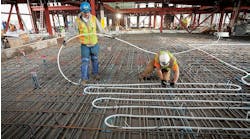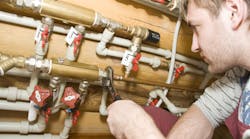Latest from Best Practices
Sponsored
By Shay Bloch, Co-founder and CEO of Jobox.ai
In December 2007, The Great Recession hit, marking the beginning of the worst recession since World War II. There have been periods of economic turbulence since then, particularly at the beginning of COVID-19. The pandemic sent the country spiraling into a national health crisis and economic crisis. Now, experts say we're headed for another period of economic instability. As we brace for this, the skilled trade industry is equipped to endure the worst of it.
Historical Resilience
The past serves as a blueprint for understanding what the future may hold for the skilled trades as far as an economic downturn. While the industry won't be completely untouched by a recession, it can withstand economic turmoil.
Take locksmiths, for example. In 2008, mortgage lenders repossessed 46,750 homes after their borrowers couldn't keep up with their repayments. The figure marked a 68% increase in repossessions compared to 2007, when mortgage lenders claimed 27,900 homes. And what did all these repossessed homes have in common? They needed new locks. This situation created higher demand for locksmiths, while other industries collapsed.
Similarly, the current looming economic downturn doesn't seem to impact projected employment of electricians, plumbers or repair workers, for instance. The US Bureau of Labor Statistics projects the employment of electricians to grow 9% from 2020 to 2030, about as fast as the average for all occupations. In comparison, the Bureau expects employment of couriers and messengers to decline by 8% in the same timeframe.
Demand and Consumer Spending
The skilled trades don't just have a magic wand that protects them from economic downturns. They remain mostly untouched because they often solve pressing problems consumers can't afford to postpone. And while people are more likely to take on DIY projects during a downturn, some home improvement projects still require an experienced professional.
System replacements such as HVAC, plumbing, electricity or garage door repair are some examples of projects homeowners must complete on time. If a garage door or plumbing installation isn't working properly, homeowners don't have a choice but to replace it right away. The macroeconomic situation has little impact on the homeowner's decision to move forward.
So although home improvement spending tends to decline in a recession, this trend doesn't apply to system replacements. It becomes even more apparent as these systems gain in complexity. For instance, the growing number of sophisticated climate-control systems is expected to increase demand for qualified HVACR professionals.
Policy and regulation changes also help neutralize the effect of economic downturns on skilled trades. For instance, the employment of sprinkler fitters is expected to increase as states continue to adopt new building codes that require using fire suppression systems. Homeowners must replace these systems and bring them up to code, regardless of the overall health of the economy.
Steps to Maximize Stability
Even though technical and regulatory requirements limit the impact of economic downturns on skilled trades, professionals still suffer indirect consequences. Limited budgets may push consumers to ask for lower prices or out-of-scope work. The cost of administrative work related to business management may also increase. Therefore, it is important that professionals still take steps to keep their businesses afloat and thriving during a downturn.
The first step home service professionals can take is to diversify their sources of work to guarantee a steady stream of job opportunities. Building an online presence and creating user profiles on various service marketplaces are two of the main ways professionals can create that diversification.
Pros can also maximize their profit by upgrading their processes. Digitizing workflows and using technology to automate administrative tasks will save a lot of time on each job. Less time spent managing a job is more revenue going to the business. This tactic will be especially useful if customers start asking pros to lower their prices.
Finally, using mobile apps can make it easier for home service professionals to manage their business on the go. Text-based communication with customers and mobile-based invoicing are tools that can minimize disputes and out-of-scope requests from customers.
Skilled Trades are the Future
Technical knowledge, local regulations and job necessity are three major components that make the skilled trades a recession-proof industry. Although professionals must still take steps to minimize the impact of a downturn, it is likely their business will grow in the long term. As such, a career in the skilled trades is a promising opportunity for people entering the workforce.
Shay Bloch is a serial entrepreneur and product leader with over 15 years of experience. He is the co-founder and CEO of Jobox, a marketplace infrastructure for the home services industry. Shay has a Bachelor’s in Psychology from the Open University of Israel and a Master’s degree in Kids & Youth digital culture marketing from Tel Aviv University.


